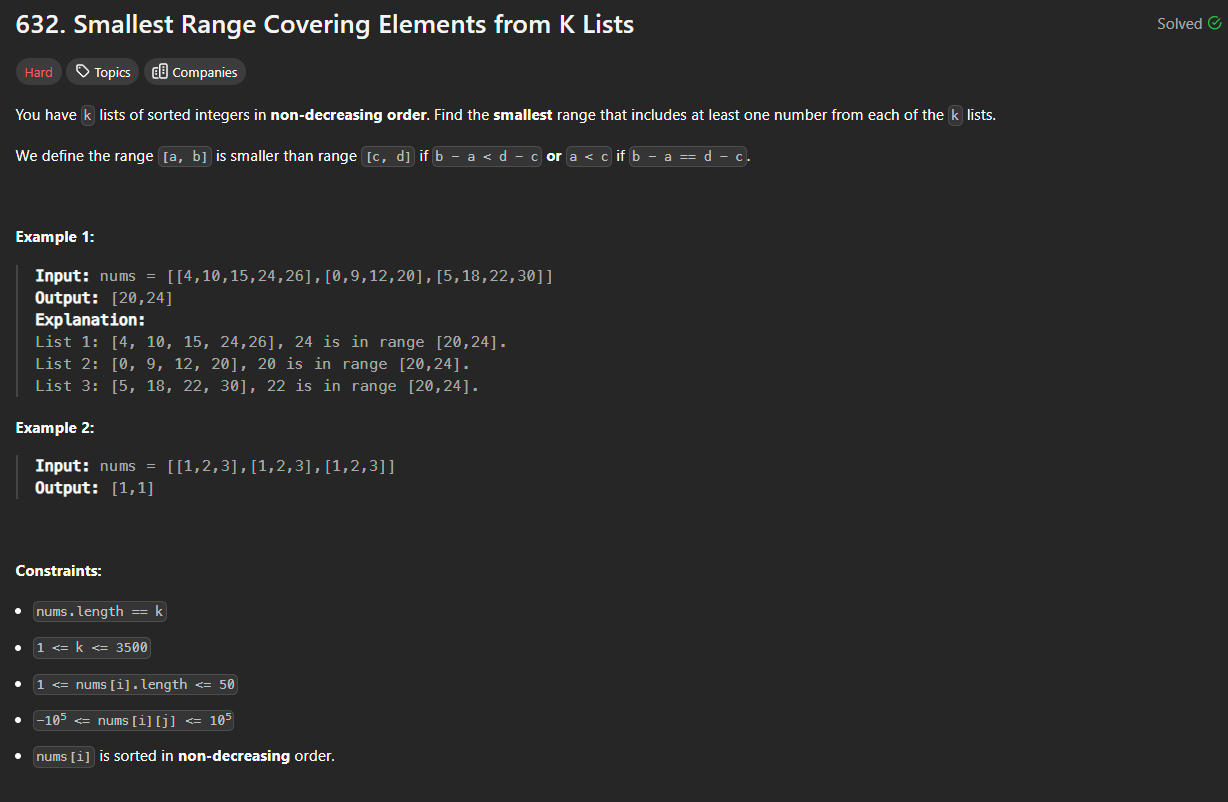Problem Statement

Brute Force [TLE]
class Solution:
def smallestRange(self, nums: List[List[int]]) -> List[int]:
arr = []
for i, num in enumerate(nums):
arr.extend([[val, i] for val in num])
arr.sort(key=lambda x: (x[0], x[1]))
N = len(arr)
num_subarrays = len(nums)
min_length = float('inf')
res = []
for i in range(0, N - num_subarrays + 1):
seen = set()
j = i
while j < N:
seen.add(arr[j][1])
if len(seen) == num_subarrays:
break
j += 1
if len(seen) < num_subarrays:
continue
curr_length = arr[j][0] - arr[i][0] + 1
if len(seen) == num_subarrays and min_length > curr_length:
res = [arr[i][0], arr[j][0]]
min_length = curr_length
return res
Editorial
Approach 1: Optimal Brute Force
class Solution:
def smallestRange(self, nums: List[List[int]]) -> List[int]:
k = len(nums)
# Stores the current index of each list
indices = [0] * k
# To track the smallest range
range_list = [0, float("inf")]
while True:
cur_min, cur_max = float("inf"), float("-inf")
min_list_index = 0
# Find the current minimum and maximum values across the lists
for i in range(k):
current_element = nums[i][indices[i]]
# Update the current minimum
if current_element < cur_min:
cur_min = current_element
min_list_index = i
# Update the current maximum
if current_element > cur_max:
cur_max = current_element
# Update the range if a smaller one is found
if cur_max - cur_min < range_list[1] - range_list[0]:
range_list[0] = cur_min
range_list[1] = cur_max
# Move to the next element in the list that had the minimum value
indices[min_list_index] += 1
if indices[min_list_index] == len(nums[min_list_index]):
break
return range_list
Approach 2: Priority Queue (Heap)
class Solution:
def smallestRange(self, nums: List[List[int]]) -> List[int]:
# Priority queue to store (value, list index, element index)
pq = []
max_val = float("-inf")
range_start = 0
range_end = float("inf")
# Insert the first element from each list into the min-heap
for i in range(len(nums)):
heapq.heappush(pq, (nums[i][0], i, 0))
max_val = max(max_val, nums[i][0])
# Continue until we can't proceed further
while len(pq) == len(nums):
min_val, row, col = heapq.heappop(pq)
# Update the smallest range
if max_val - min_val < range_end - range_start:
range_start = min_val
range_end = max_val
# If possible, add the next element from the same row to the heap
if col + 1 < len(nums[row]):
next_val = nums[row][col + 1]
heapq.heappush(pq, (next_val, row, col + 1))
max_val = max(max_val, next_val)
return [range_start, range_end]
Approach 3: Two Pointer
class Solution:
def smallestRange(self, nums: List[List[int]]) -> List[int]:
merged = []
# Merge all lists with their list index
for i in range(len(nums)):
for num in nums[i]:
merged.append((num, i))
# Sort the merged list
merged.sort()
# Two pointers to track the smallest range
freq = defaultdict(int)
left, count = 0, 0
range_start, range_end = 0, float("inf")
for right in range(len(merged)):
freq[merged[right][1]] += 1
if freq[merged[right][1]] == 1:
count += 1
# When all lists are represented, try to shrink the window
while count == len(nums):
cur_range = merged[right][0] - merged[left][0]
if cur_range < range_end - range_start:
range_start = merged[left][0]
range_end = merged[right][0]
freq[merged[left][1]] -= 1
if freq[merged[left][1]] == 0:
count -= 1
left += 1
return [range_start, range_end]
- time: O(n log n)
- space: O(n)
